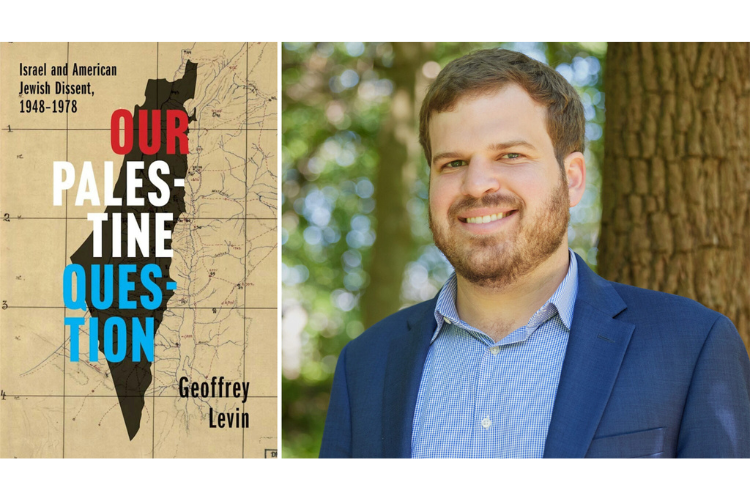Geoffrey Levin Publishes New Book on the American Jewish Relationship with Israel and Palestinian Rights

Assistant Professor of Middle Eastern and Jewish Studies and core faculty member at the Tam Institute for Jewish Studies Geoffrey Levin recently published Our Palestine Question: Israel and American Jewish Dissent, 1948-1978. In his recent review, Tel Aviv Review of Books columnist Zev Mishell praises its remarkable insight into the creation and evolution of the relationship between the world’s two largest Jewish communities. Our Palestine Question,” he notes, “achieves what historians do at their best: it challenges communal memory, complicates what was once considered solid, and disrupts the perceived inevitability of our current political moment.”
American Jews began debating Palestinian rights issues even before Israel’s founding in 1948. In his book, Levin recovers the voices of American Jews who, in the early decades of Israel’s existence, called for an honest reckoning with the moral and political plight of Palestinians. These now‑forgotten voices, which include an aid‑worker‑turned‑academic with Palestinian Sephardic roots, a former Yiddish journalist, anti‑Zionist Reform rabbis, and young left‑wing Zionist activists, felt drawn to support Palestinian rights by their understanding of Jewish history, identity, and ethics. They sometimes worked with mainstream American Jewish leaders who feared that ignoring Palestinian rights could foster antisemitism, leading them to press Israeli officials for reform. But Israeli diplomats viewed any American Jewish interest in Palestinian affairs with deep suspicion, provoking a series of quiet confrontations that ultimately kept Palestinian rights off the American Jewish agenda up to the present era.
While particularly timely in light of current geopolitics, Levin’s research into this hidden history harkens back to the start of his doctoral studies at New York University about ten years ago. “In my first year as a PhD student, I started thinking I’d write about diplomatic (topics),” Levin recalls. “But I took a course about Arabs in Israel, learned about how they faced a lot of restrictions in the 1950s, and I wanted to see how Jewish groups interacted with it… I just found piece by piece, person by person, these untold stories.”
Unearthing these narratives took Levin beyond the Jewish history special collections in Manhattan and Israel State Archives in Jerusalem. For example, he met with the widow of Don Peretz – an American Jewish professor of political science who became a main figure for the book – and spent days in her retirement community going through old letters from the 40s and 50s. Six years ago, he traveled to Utah to explore a vast collection virtually untapped by Middle East scholars: the papers of Dr. Fayez Sayegh, who ran the New York’s League’s Arab Information Center in the 1950s. Sayegh essentially served as the chief Arab spokesman in the United States at the time, in essence a Palestinian counterpart to Israeli ambassador Abba Eban. Eventually, Levin realized he had enough new, fresh material for his dissertation, which served as the foundation for his book.
The timing of Our Palestine Question isn’t lost on Levin, who hopes his research is heartening for people trying to understand the diversity of American Jewish response and relationships with Israel on Palestine. “There’s a long history of American Jews caring about people on both sides of this conflict,” he reflects. “There’s not one way to express yourself as a Jew; there’s not one Jewish political response to any given (topic). There’s always been a diversity of opinions on issues. These have always been hard questions, going back to ’48.”
Ultimately, in reconstructing this hidden history, Levin lays the groundwork for more forthright debates over Palestinian rights issues, American Jewish identity, and the U.S.‑Israel relationship more broadly. If you’re interested in reading Our Palestine Question, you may find it available for purchase from the Yale University Press as well as other retailers, including in ebook and audiobook formats.
Published 4/17/24